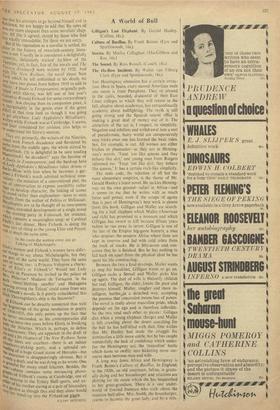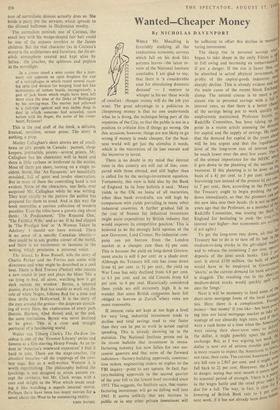A World of Bull
Gilligan's Last Elephant. By Gerald Hanley. (Collins, 18s.) The Sound. By Ross Russell. (Cassell. 18s.) Tur Hemingway obsession has a certain attrac- tion. Here in Spain, every second American male
one meets is from Pamplona. They sit around in the cafés, bearded, disdainful of their East Coast colleges to which they will return in the fall, abusive about academics, but extraordinarily academic about bullfighting. The myth is still going strong and the Spanish tourist office is making a great deal of money out of it. The attraction of the act is, 1 suspect, its simplicity. Negation and nihilism and withdrawal into a sort of pseudo-male, hairy world are comparatively easy tricks once one has learned the basic rules. Sex, for example, is out. All women are either bitches or phantasies-1- as they are in Heming- way's novels. 'Treat 'cm like queens and they behave like dirt,' one young man from Rutgers informed me. 'Treat 'cm like dirt, they behave like queens.' It has a certain rock-like simplicity.
The male code, the rejection of all but the most elementary empirics, is the theme of Mr. Gerald Hanley's latest novel. He tackles Heming- way on his own ground--safari in Africa—and it seems to me that he writes with as much force and power, even if the scrape of agony that is part of Hemingway's best work is absent from this book. Gilligan and Muller are search- ing for a bull elephant which Muller (American and rich) has promised to a museum and which Gilligan has sworn to kill because fifteen years before he ran away in terror. Gilligan is one of the last of the Empire big-game hunters, a man who despises the modern Africa where lions are kept in reserves and fed with cold Zebra from the back of trucks. He is fifty-seven and con- scious that he is finished. But he has nothing to fall back on apart from the physical ideal he has spent his life constructing.
Between the two a feud develops. Muller wants to stop for breakfast, Gilligan wants to go on. Gilligan sacks a Somali and Muller picks him up again. The duel of wills is blatantly childish but real. Gilligan, the elder, forces the pace and destroys himself. Muller, tougher and more in- telligent, battleso,in a detached way, accepting the premise that concession means loss of power. The novel is really about masculine pride, which depends on the ego and is therefore inflexible. So the two rend each other to pieces: Gilligan dies when a young elephant charges and Muller is left crawling about the desert searching for the bull he has half-filled with shot. One wishes that Mr. Hanky had made the struggle for domination a little more subtle, but he has caught wonderfully the lack of confidence which under- lies the Hemingway act, the 'masculine' battle which turns so swiftly into bickering more cor- rosive than between man and wife.
A long way from Africa and Hemingway is Frank Baines's Culture of Bacillus. In England, in the 1920s, an old courtesan. Selina, is gradu- ally dying and her housekeeper and relations are plotting for the estate which she has bequeathed to her great-grandson, There is a vast under- world of livened footmen who stalk about the mansion half-alive. Mrs. Smith, the housekeeper, earns to become the great lady, and by a mix-
titre of surrealistic devices actually does so. She holds a party for the servants which spreads to the disused ballroom in Dickensian revelry.
The surrealism reminds one of Cocteau, the small boy with his wedge-shaped fair hair could be one of the enfants terribles or the James children. But the real character (as in Cocteau's story) is the architecture and furniture, the fin-de- siècle atmosphere created and kept alive by Selina: the coaches, the sphinxes and poplars in the moonlight.
In a corner stood a wine cooler like a mor- tuary urn opposite an open fireplace the size of a sarcophagus in which rested several roast- ing spits and devices for keeping food hot like instruments of torture beside, incongruously, a pair of jack boots which might have been left there since the time of the Duke of Wellington by his serving-man. The marble had yellowed to a rich-ripe apricot and was inches deep in dust in which someone- had scrawled. years before with his finger, the name of his sweet- heart. Patience!
This is the real stuff of the book, a delicate, Ironical, sensitive, ornate prose. The story is nothing, a prop.
Morley Callaghan's short stories are of small- town or city people in Canada : parents, shop- keepers. journalists, priests—several priests. Mr. Callaghan has his characters well in hand and there is little verbose or irrelevant in the stories. Most of them are short, turning on a single in- cident. Some, like 'An Escapade,' are beautifully moulded, full of quiet and tender observation. But in most of them the controlling hand is too evident. None of the characters, one feels, ever surprised Mr. Callaghan while he was writing. They kept strictly to the pattern the author has prepared for them to tread. And in this way the book resembles a curious collection of modern parables. Even the titles have a gnostic ring about them: 'A Predicament,' The Rejected One,' The Faithful Wife,' and so on. If he had slipped In 'The Prodigal Son' or 'A Woman Taken In Adultery' I should not have noticed. There Is no sense of a specific Canadian identity— they could be in any grubby corner of the world, and there is no excitement or tautness in the writing which proclaims a personal voice. The Sound, by Ross Russell, tells the story of Charlie Parker and the Forties jazz scene with directness and what might be described as a cool beat. There is Red Travers (Parker) who creates a new sound in jazz and plays the blues 'like a cat lying in bed, all alone, watching how it get dark outside the window.' Bernie, a talented pianist, drawn by Red but unable to work out the role of white Negro, follows Red for a time and then drifts into Hollywood. It is the story of the men around the genius—the desperate stretch- ing of ever) fibre, the exploration of every path (heroin, Harlem, 42nd Street) and, at the end, the same limitations_ Bernie was never destined to be great. This is a clear and straight portrayal of a fascinating world.
Walter van Tilburg Clark's The Ox-Bow In- cident is one of the 'Frontier Library' series and famous as a film starring Henry Fonda. As an in- dent in 'America's westward expansion' I rind it hard to take. There are the stage-coaches, the décolleté beauties—all the trappings of the cow- boy saga. But as a well-written Western it is worth republishing. The philosophy behind the lynchings is not designed to strain anyone ex- cept the cowboys, but Mr. Clark writes with a care and delight in the West which made read- ing it like W a t chi ng a superb internal movie. Perhaps there have been too many movies for a novel about the West to be convincing reality.
JOHN DANIEL































 Previous page
Previous page